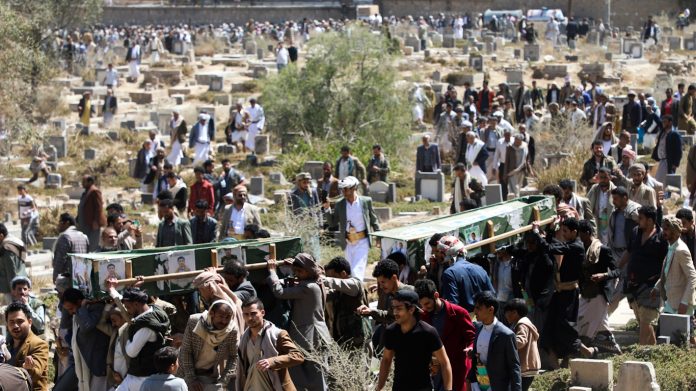President Donald Trump’s new Yemen campaign is driving what experts call a spiraling humanitarian disaster, nearly doubling the previous administration’s costs while slashing aid and intensifying airstrikes.
Under pressure from powerful Washington think tanks, Trump has sharply increased airstrikes, cut $107 million in aid, and designated Yemen’s Ansar Allah as a Foreign Terrorist Organization (FTO )—all steps that experts and aid groups say are deepening famine, displacement, and collective punishment.
The latest moves target Ansar Allah-controlled northern Yemen, home to roughly 70% of the population and 80% dependent on food imports. April’s cuts to humanitarian aid, along with a deliberate U.S. campaign to bomb ports and airports, are putting millions at risk.
Humanitarian organizations—including Action Against Hunger and the World Food Program—warn that aid restrictions and destroyed infrastructure have left at least 19.5 million Yemenis in urgent need, with 64% of households unable to meet basic food needs and children facing malnutrition rates among the highest in the world.
These policies mirror the siege tactics imposed by Israel on Gaza, and, according to Washington-based NGOs and experts, go even further. Democracy for the Arab World Now (DAWN) cautions that Trump’s escalation “might also plunge the country into famine.”
Trump’s January decision to designate Ansar Allah as an FTO reversed the Biden administration’s more cautious approach. Biden, reacting to Ansar Allah’s actions against Israel, had classified the group as a “specially designated global terrorist” in early 2024, but stopped short of the FTO label to avoid cutting off lifesaving aid.
As Anne Garella of Action Against Hunger warned, “The FTO designation could lead to restrictions or delays on imports of essential commodities, as well as higher prices. In a country where 49% of the population is food insecure and 55% of children under five suffer from chronic malnutrition, this could have devastating consequences.”
Since the escalation, more than 531,000 people have been newly displaced, and another 1.3 million have slipped below the poverty line.
The cumulative effect of U.S. actions, along with a U.S.-backed Saudi blockade in place since 2015, has been catastrophic. The blockade alone has driven famine, a cholera outbreak, and mass starvation—especially among children. Of the estimated 400,000 civilians killed during the U.S.-backed war, most died due to blockade-induced deprivation.
Behind the scenes, major Washington think tanks are encouraging the White House to intensify the siege. The Foundation for Defense of Democracies, a key player in the build-up to the Iraq War, justified recent U.S. airstrikes that killed 80 civilians at Yemen’s Ras Issa port, claiming such attacks degrade “the economic source of power” for Ansar Allah.
The Heritage Foundation, one of Trump’s chief policy influencers, has argued in its “Government by Injunction” commentary that aid organizations—groups humanitarian officials fear could be blocked from conducting life-saving missions—could “turn out to be fronts for the Iran-backed Houthis, who are trying to sink ships that traverse the Red Sea, as well as kill Israelis with their rockets. (Or terrorists could wind up stealing the money from the needy. It’s happened before.)”
Dana Stroul, director of research at the pro-Israel Washington Institute for Near East Policy and a former top Biden Defense Department official, has publicly advocated “increasing maritime and overland interdiction efforts” to block Iranian resupply of Ansar Allah—an approach that would further tighten the blockade. While Stroul recommends mitigating civilian harm and supporting aid efforts, her “maximum pressure” strategy would effectively deepen the suffering of Yemen’s already vulnerable, starving civilian population.
The severity of the crisis is starkly illustrated in the World Organisation Against Torture’s “Torture in Slow Motion” report, which found that the U.S.-backed blockade has “substantially contributed to pushing Yemeni civilians into starvation and can be considered torture.”
With U.S. military attacks ramping up and think tanks calling for harsher collective punishment, aid agencies and human rights advocates warn that Yemen is spiraling into deeper catastrophe. If Trump continues down this path—halting aid, bombing infrastructure, and tightening import restrictions—the result will be a man-made famine and a yet another stain on U.S. foreign policy.
Feature photo | Crowds gather at Al Mashhad cemetery in Sanaa, Yemen, on April 23, 2025, to bury victims of recent U.S. airstrikes. The mass funeral highlights the mounting civilian toll of the ongoing conflict and deepening humanitarian crisis in Yemen. Photo by Osamah Abdulrahman | AP
Robert Inlakesh is a political analyst, journalist and documentary filmmaker currently based in London, UK. He has reported from and lived in the occupied Palestinian territories and hosts the show ‘Palestine Files’. Director of ‘Steal of the Century: Trump’s Palestine-Israel Catastrophe’. Follow him on Twitter @falasteen47
The post Trump’s Yemen Surge: How Policy from DC Think Tanks Brought Famine Roaring Back appeared first on MintPress News.
